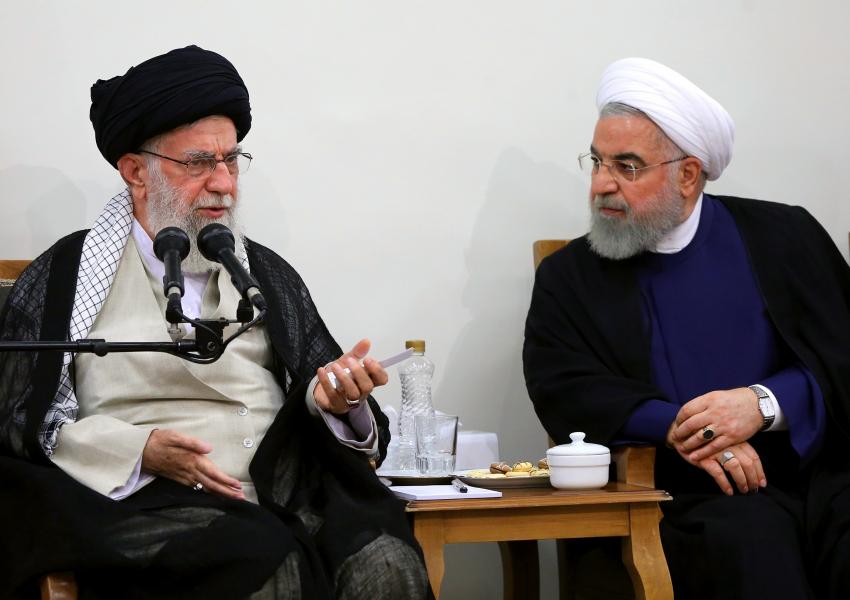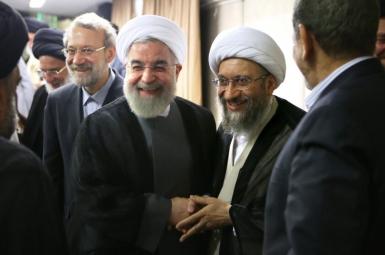
Top Iran Lawmaker Calls For Getting Rid Of Presidential System
A prominent Iranian lawmaker close to Supreme Leader Ali Khamenei's office has suggested that the Islamic Republic should do away with its presidential system and revert to a parliamentary model in which the legislature (Majles) appoints a prime minister.
Deputy Majles Speaker Amir-Hossein Ghazizadeh Hashemi has said in a September 6 interview with semi-official ISNA news agency that it is difficult for the parliament to make the president accountable in the current system.
Iran International's analyst Morad Veisi wrote in a tweet on Sunday that Hashemi is voicing Khamenei's demand, adding that the Supreme Leader wishes to get rid of this not-so-perfect system, which is based on the election of a president by popular vote.
In his more than 30 years of rule, Khamenei has always had conflicts with presidents, who were actually elected by people’s vote, while the Supreme Leader himself, selected by a few regime insiders, could not claim such a mandate.
Moreover, presidential elections are a big headache for Khamenei because people tend to express their unfulfilled aspirations when they choose a president. It is just hard for Khamenei to find a candidate who will bring out the vote but at the same time is loyal to him and will not try to use his popular mandate and go against his wishes.
Now, the Supreme Leader has an obedient parliament made up of loyal hardliners, and perhaps this is the opportunity to get rid of the presidency.
Veisi said: "What Khamenei wants to do is to have a prime minister who can be replaced by the Majles with a new, obedient one, if he [Khamenei] wakes up one day and thinks he does not like the premiere."
Hashemi said in the interview: "We need to revive the prime ministerial system in order to be able to monitor the administration."
"At the time being we cannot go against the President who is a political symbol elected by the people," Hashemi said in asurprisingly candid remark. "In a parliamentary system we can topple the administration many times. Sometimes we need to change individuals quickly."
The idea of changing the presidential system was first introduced in Iran under President Mahmoud Ahmadinejad who had continuous rifts with the Majles and even with the Supreme Leader. But Khamenei decided to keep Ahmadinejad until the end of his term of office although the Majles was prepared to impeach and topple him.
However, during this debate in 2011, Khamenei did say that if one day the regime feels "the parliamentary system is better for selecting the head of the executive, there would be no problem to change the current setup."
Since the new Majles started work in May, Rouhani has also been involved in continuous disputes with the parliament and its speaker Mohammad Baqer Qalibaf. Rouhani went to the Majles only once on the opening day when Qalibaf was still not elected as speaker. Later he refused to go to the parliament to introduce his choice for the post of Minister of Industry.
The current Majles has started motions to impeach or at least question Rouhani, but Khamenei stopped the motion and insisted that Rouhani should remain in office until the end of his term.
Last year, it was reformist analyst Abbas Abdi who called for changing the presidential system as a solution to the problem of constant face-offs between the Majles Speaker and the President.
Ghazizadeh Hashemi who is a member of the Iranian Parliament from Mashad and Kalat, has opined that the country needs to have a parliamentary-prime ministerial system "for a long time". He said Japan has tried this system after the war and although one political party ruled in that country for about 50 years, no cabinet remained in office longer than two years.
He stressed, "sometimes we need to turn to a new person in order to stop or prevent a crisis." He added, "every time we want to impeach a minister we will have a new problem with the president. But such frictions won't occur if there is a prime minister."
Until 1989 Iran had both a president and a prime minister. The country's last prime minister was Mir Hossein Mousavi who worked under then-President Ali Khamenei. The two had many problems with each other and Ayatollah Rouhollah Khomeini's support for the prime minister made the crisis even worse until the end of that period.
Ironically, Rouhani's critics have at times criticized him for his powerlessness and called him Khamenei's prime minister.








